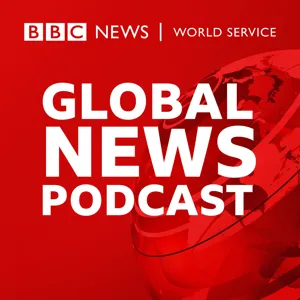Podcast Summary
Challenges to creating a two-state solution for Israeli-Palestinian conflict: Creating a two-state solution for Israeli-Palestinian conflict faces challenges from borders, population displacement, contiguous territory, and Jerusalem's status as a potential shared capital, impacting demographic balance and Israeli Jewish majority.
The creation of a two-state solution for the Israeli-Palestinian conflict is a complex issue with several challenges. The two main issues discussed were the borders between Israel and Palestine, and the status of Jerusalem as a potential shared capital. The borders pose a challenge due to Israeli settlements built beyond the 1967 borders, requiring land swaps and potential population displacement. For Palestine to have a viable state, contiguous territory is necessary, but current divisions and settlements make this difficult. Jerusalem is another contentious issue, as both sides claim it as their capital. The right of return for Palestinian refugees is a significant point of contention, as it could potentially change the demographic balance and threaten Israel's Jewish majority. These challenges were discussed in the context of the Oslo peace process and the long-term efforts of Tony Klug to promote a two-state solution.
The Israeli-Palestinian conflict: renewed talks of a truce and the potential for a two-state solution: Renewed talks of a truce in the Israeli-Palestinian conflict bring hope for a two-state solution, but challenges such as security concerns, economic implications, and defining a Jewish state persist.
The Israeli-Palestinian conflict is a complex issue with deep historical roots and emotional ties, where every perceived advance has followed a seismic event. The latest seismic event is the current crisis, which has led to renewed talks of a possible truce. One potential advance could be the establishment of a two-state solution, where Palestine and Israel exist side by side. However, this is met with opposition from those who advocate for a one-state solution, which would create a single binational state. Security concerns, economic implications, and the definition of a Jewish state are among the many challenges that need to be addressed. It's important to remember that this is a deeply contentious issue, and there are strong emotions and opinions on both sides. Tony Klug, an expert on the matter, will provide further insights into the political context and the complexities of the situation.
Crises in Middle East history led to peace breakthroughs: Crises can drive peace in Middle East, but external intervention may be needed for Israeli-Palestinian conflict resolution. A two-state solution satisfying core aspirations and fears is the ultimate goal, but alternative proposals are open for discussion.
Crisis can serve as a catalyst for peace in the Middle East, as evidenced by major breakthroughs following the 1973 Egypt Israel war, the 1987 intifada, and the 2000 2nd intifada. However, these events were primarily driven by internal factors, and external intervention may be necessary for the ongoing conflict between Israelis and Palestinians. The ultimate solution, according to the speaker, is a two-state solution that satisfies the minimum core aspirations of both peoples and allays their maximum fears. While some argue for a one-state solution, the speaker acknowledges the potential for a binational state or other alternatives, but emphasizes the importance of collective rights and national self-determination for both Israelis and Palestinians. The speaker's goal is to see the conflict resolved, and they are open to alternative proposals that can achieve this objective.
Focusing on horizontal connections for a natural confederation: Exploring connections in politics, trade, sports, and culture may lead to a confederation between Israel and Palestine, involving Jordan.
Achieving equality under the law and self-determination for both Israelis and Palestinians within a single state may not be realistic due to deep-rooted hatreds and historical differences. Instead, focusing on horizontal connections between political parties, trade unions, sporting activities, and cultural activities may lead to a natural confederation between Israel and Palestine, potentially including Jordan. Negotiating styles also differ, with Israelis adopting a western-style approach of proposing less than they're prepared to accept, while Arab initiatives have focused on the end game before discussing logistics. Both Israel and Hamas currently seem to lack a clear strategy or endgame, and their actions may appear self-destructive in the current circumstances.
A century-old territorial dispute between Israel and Palestine: The complex conflict between Israel and Palestine, rooted in distinct histories and narratives, requires a territorial solution to prevent further suffering for ordinary people.
The ongoing conflict between Israel and Palestine, which has persisted for decades, is fundamentally a territorial dispute between two peoples with a long history of suffering. Hamas and Israel's strategies have led to devastating consequences for ordinary people, with Hamas fearing being sidelined in regional politics if Israel establishes relations with powerful countries like Saudi Arabia. The conflict, which has outlived the century that created it, is complex and rooted in different narratives from each side. My eureka moment came when I realized that there were two distinct histories and narratives, which influenced my doctoral research. Despite the challenges, it's still possible to find a solution, but the longer it goes on, the more difficult it becomes. It's essential to understand the complexities of this conflict and the importance of finding a territorial solution.
The Israeli-Palestinian conflict: A complex issue with deeply rooted emotions: A two-state solution, based on mutual recognition and self-determination, remains the only viable option for resolving the Israeli-Palestinian conflict, requiring political will.
The Israeli-Palestinian conflict is a complex issue with multiple histories and perspectives, making a peaceful resolution challenging. Objective reporting is impossible due to the deeply rooted emotions and passions involved. A two-state solution, once seen as the most viable option, is now questioned due to changing circumstances such as increased settlements and shifting public opinion. However, the speaker argues that it's the only plausible solution, and the only way to make it feasible is with political will. Despite the challenges, mutual recognition and self-determination are key to resolving the conflict and avoiding eternal conflict. The speaker's personal experience shows that the conflict has dominated their life for over five decades, highlighting the urgency for a resolution.
International condemnation of Israeli settlements lacks effective enforcement: The absence of concrete actions against Israeli settlements hinders the possibility of a two-state solution, leading to an unsustainable situation and potential dangerous consequences for Israel
While the international community, including the United States and the European Union, have condemned the illegal settlements in occupied territories, their words have not been backed up with effective enforcement mechanisms. This has allowed the situation to escalate, making a two-state solution increasingly difficult. The Israeli government, led by Netanyahu and far-right politicians like Smotrich, have a vision of annexing the entire West Bank and making it difficult for Palestinians to stay. This approach is unsustainable and could lead to dangerous consequences for Israel. A more peaceful solution could be modeled after the Czechoslovakia example, where two states could collaborate and coexist next to each other. The Palestinian government could offer citizenship or residency to settlers, creating a more harmonious situation. However, this would require a shift in mindset and actions from all parties involved.
Long-standing Israeli-Palestinian conflict stalemate: External pressure and intervention from the international community, particularly the US, are crucial for resolving the Israeli-Palestinian conflict as internal efforts have failed.
The Israeli-Palestinian conflict is a long-standing dispute with both sides holding extreme views, each wanting control of the entire territory from the river to the sea. This standoff has led to a stalemate, with Israel wanting to destroy Hamas and establish its dominance, while Hamas seeks an entirely Islamic state with minimal rights for Jews. The international community has attempted to intervene and resolve the issue, but with limited success. Previous conflicts, such as those in Northern Ireland, the Cold War, and apartheid, were primarily resolved by the parties involved with external assistance and pressure. However, in the Israeli-Palestinian conflict, when internal efforts failed, there was a lack of sufficient external pressure and intervention, leading to the ongoing crisis. The international community, particularly the United States, has a crucial role to play in bringing the necessary pressure and facilitating a peaceful resolution.
The Long and Disappointing Journey of the Israel-Palestine Conflict: Despite initial optimism, the Israel-Palestine peace process has been marked by disappointment and stagnation, with Netanyahu's rise to power marking the end of dialogue groups and a shift towards uncooperative leadership on both sides.
The Middle East conflict between Israel and Palestine, as represented by the assassination of Yitzhak Rabin and the subsequent decline of peace talks, has been a long and disappointing journey. The initial optimism following the Oslo Accords was short-lived, leading to a sense of despair and stagnation in the peace process. Netanyahu's rise to power marked the end of dialogue groups and the Palestinians' realization that peace was no longer a viable option. The current leadership, particularly Netanyahu, is seen as uncooperative, while Palestinian authority leadership is weak and unable to deliver on any potential deals. Arafat, despite his faults, could have made a difference had he been given the chance. In an ideal world, a 2-state solution would involve regional powers taking the lead in negotiations, as opposed to the US, who have historically mishandled the situation. The recent Abraham Accords provide an opportunity for this approach, with countries like the UAE, Bahrain, Morocco, and potentially Saudi Arabia taking a more active role.
Creating a contiguous Palestinian territory with shared security: To achieve peace between Israel and Palestine, we need a shift in perspective, removal of barriers, and creation of joint security arrangements, supported by a deep understanding of history and education initiatives.
Achieving peace between Israel and Palestine in the next decade requires a shift in perspective and the creation of a contiguous Palestinian territory with shared security. This would involve removing barriers, checkpoints, and creating joint security arrangements. The key to this lies in the political will for peace and the understanding of history. Unfortunately, many young people today are not learning enough about Middle Eastern history in schools, leaving politicians without a deep understanding of the issues. To address this, an initiative spearheaded from the region, supported by the US and Western governments, could be established, focusing on the Arab Peace Initiative and potentially leading to a confederation including Israel, Palestine, and Jordan. This would require the involvement of experts with a deep understanding of the history and current issues to guide the process.
Hoping for resolution of long-standing conflicts: Despite complexities, optimism exists for peaceful resolutions; new leadership and genuine effort needed
That despite the seemingly unsolvable conflicts, such as those in Northern Ireland, apartheid, and the Israeli-Palestinian issue, which have persisted throughout generations, there is an underlying optimism that they will eventually be resolved. However, the challenges of the present make it more difficult, and there is a need for new leadership on both sides to move things in the right direction. The historical context and expertise of individuals like Tony Klug are invaluable in understanding these complex issues, as opposed to relying on simplistic explanations from tweets or other sources. The key to finding a solution lies in the willingness of both sides to put in real effort towards peace.






